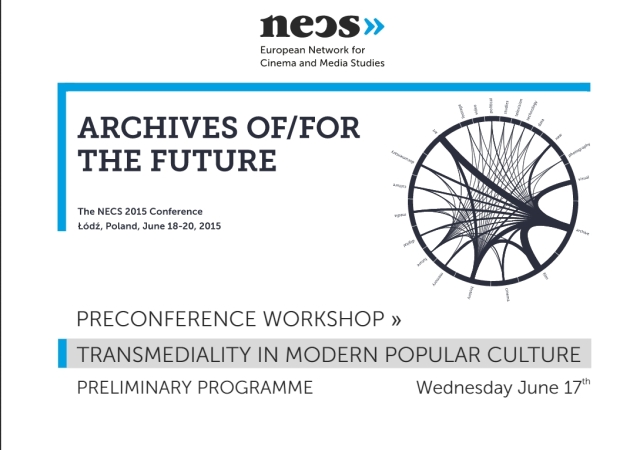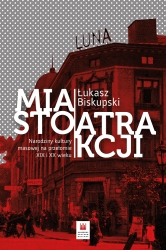W dniach 17-20 czerwca 2015 roku Uniwersytet Łódzki i Szkoła Wyższa Psychologii Społecznej w Warszawie organizują w Łodzi doroczną konferencję NECS – European Network for Cinema and Media Studies. Mam przyjemność być członkiem komitetu organizacyjnego tego wydarzenia. W ramach konferencji odbędzie się również warsztat „Transmediality in modern popular culture” (wstępny program – poniżej).
NECS (www.necs.org) to organizacja naukowo-badawcza działająca jako stowarzyszenie, zrzeszająca ok. 1300 naukowców, kuratorów i inne osoby zawodowo związane z mediami. NECS rozwija wysokiej jakości historyczne, teoretyczne i praktyczne badania z obszaru
filmu i mediów; zapewnia przestrzeń dla profesjonalnych debat; wspiera młodych badaczy i badaczki; dąży do wzmocnienia pozycji badań filmo- i medioznawczych w europejskiej humanistyce. Temat konferencji, która odbędzie się w Łodzi, brzmi: „Archives of/for the Future“. Będzie ona dotyczyć zagadnień związanych z digitalizacją i archiwami kultury.
Strona konferencji: www.necs.org/conference
PRECONFERENCE WORKSHOP»TRANSMEDIALITY IN MODERN POPULAR CULTURE
In reference to one of the conference‘s sub-themes „The archive of popular culture” a workshop on the history of transmediality in modern popular culture will be held. It will focus on the exploration of cross-media business synergies in the entertainment industry and on the history of media convergence in the 19th and the first half of the 20th century popular culture (before 1939).
SCOPE
Media convergence is one of the widely debated concepts in contemporary media research. As conceptualised by Henry Jenkins, convergence manifests itself i.e. in transmedia storytelling (Jenkins, 2006:334). The investigation of transmediality, however, most often concentrates on contemporary networked digital media. As concerns the historical research of popular culture, transmediality is limitedly explored (however not entirely unexamined). Yet that kind of cross-textual practices can be traced as early as the modern culture industry came into existence. For example, according to Matthew Freeman, at the beginning of the 20th century in the USA we can find examples of „cross-textual self-promotion and cross-media branding (…), grounded in such cultural factors as turn-of-the-century immigration, new forms of mass media – such as, most notably, newspapers, comic strips, and magazines – and consumerism and other related textual activities” (Freeman, 2014: 2).
Therefore, we would like to explore the transmedial dimension of pop culture in the 19th and the first half of the 20th century.
- How did motives, characters, narratives circulate between various media platforms and cultural circuits?
- What was the transmedial dimension of the emerging global culture industry?
- How did mediatization processes impact on local practices (especially in the peripheral media environments)?
References:
Jenkins, Henry, Convergence Culture: where old and new media collide, NYU Press, 2006.
Freeman Matthew, Branding consumerism: Cross-media characters and story-worlds at the turn of the 20th century, International Journal of Cultural Studies, Published online before print January 21, 2014, DOI: 10.1177/1367877913515868.
ORGANIZERS
Łukasz Biskupski (University of Social Sciences and Humanities SWPS in Warsaw), Mirosław Filiciak (University of Social Sciences and Humanities SWPS in Warsaw) and Michał Pabiś-Orzeszyna (University of Łódź).
ACKNOWLEDGEMENT
The organization of the workshop is supported by the Polish National Center for Science under Grant DEC-2012/07/E/HS2/03878.




